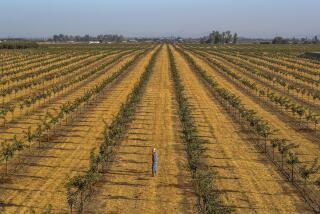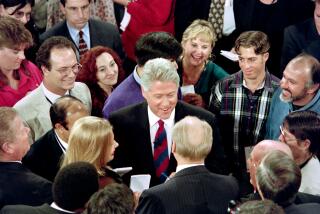Wilson Rules Out California Action Against Myanmar
SACRAMENTO — Indirectly stepping into a foreign affairs dispute over how best to deal with a brutal Third World regime, Gov. Pete Wilson has ruled out California’s taking part in a growing movement to pressure U.S. firms to stop doing business in Myanmar.
At a press conference in Thailand this week, Wilson said that for the state of California to impose sanctions on companies operating in Myanmar--formerly known as Burma--would be unconstitutional.
Furthermore, said Wilson press secretary Sean Walsh, it is up to the federal government, not the governor, to bring pressure, if necessary, on a foreign power.
Or better yet, said Walsh, who is accompanying Wilson on a trade-promoting tour of Asia, Wilson believes that Myanmar’s neighboring countries are logical sources for persuading the ruling generals to change.
Myanmar’s current rulers took over in a 1988 coup amid mass military killings of about 3,000 protesting citizens, followed by a still ongoing stream of reports detailing torture, disappearances and jailing of dissidents, slave labor and a thriving, regime-connected trade in heroin, much of it sold on the streets of the United States.
The country’s leading democracy advocate, Aung San Suu Kyi--awarded the 1991 Nobel Peace Prize while under house arrest--is regularly harassed and prevented from speaking out.
As Wilson travels through Asia, Walsh said, “we’ve been very careful not to make foreign policy as the governor of California.”
However, by just acting in a passive way on the disputed matter of trade with Myanmar, Wilson has placed the state government at odds with a wave of boycott actions by other, mostly local governments across the United States.
So far, citing gross human rights violations, Massachusetts and 12 cities or counties have applied pressure on companies to get out of Myanmar, with at least two dozen more local governments preparing to follow suit, according to Dan Orzech of the Bay Area Burma Roundtable, which encourages the boycott actions.
In California, the cities of Santa Monica, San Francisco, Oakland and Berkeley and Alameda County have passed ordinances denying government contracts to firms operating in Myanmar.
Responding to the pressure, companies such as Apple Computer, Levi Strauss & Co., Eddie Bauer and the European brewers Heineken and Carlsberg have shut down operations in Myanmar.
Ten years ago, California participated in a boycott of South Africa in protest of that country’s policy of apartheid.
The boycott, approved by the Legislature and then-Gov. George Deukmejian, required state-related retirement funds and the University of California to divest themselves of interest in companies operating in South Africa.
The ban was lifted in 1994.
Wilson, said Walsh, “could not unilaterally pass a law, sign a law or do an executive order” bringing pressure on businesses to refrain from operating in Myanmar. Dictating to businesses in that manner, he said, would be unconstitutional.
Rather, Walsh said, Wilson favors allowing “moral pressure” to build on companies and to let them take the heat from the public “if they operate in countries that are bad.”
Wilson’s remarks on Myanmar are “likely to resonate with the governments of Southeast Asia” that he is visiting as he touts trade with California firms, said Charles Morrison, an international relations specialist at the Honolulu-based East West Center.
Unlike the boycott actions in this country, several capitals on Wilson’s itinerary want Myanmar to join them as a member of the Assn. of Southeast Asian Nations, a trading bloc aimed at competing economically with China, Morrison said.
“Generally, Asian governments don’t seek sanctions on other countries” that treat their own citizens poorly, he said. Rather, they prefer what they call “constructive engagement” to bring about improvements.
Also in agreement with Wilson on Myanmar is El Segundo-based Unocal, which has remained in Myanmar as a partner in the construction of a $1-billion natural gas pipeline. Scheduled for completion next year, the line leads from offshore wells in the Andaman Sea, across southern Myanmar and into Thailand.
Barry Lane, a Unocal spokesman, said the company “absolutely” agrees with Wilson.
“Interfering” with Myanmar’s government, he said, is “not a role that a company, or the state of California or the city of Berkeley, should play.”
At his latest stop Wednesday, Wilson announced in Manila that a San Diego environmental technology company, ABCC, has landed a contract to build the Philippines’ first zero-emissions, municipal solid waste conversion plant.
Besides Manila, stops on the gubernatorial trip include Taipei, Taiwan; Beijing; Shanghai; Hong Kong; Jakarta, Indonesia; Singapore; and Bangkok, Thailand.
More to Read
Get the L.A. Times Politics newsletter
Deeply reported insights into legislation, politics and policy from Sacramento, Washington and beyond. In your inbox three times per week.
You may occasionally receive promotional content from the Los Angeles Times.










